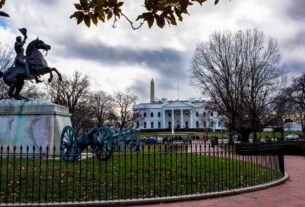((JEWISH REVIEW)) — The number of student governments taking up resolutions to boycott Israel dropped sharply last year, even as anti-Israel activity on college campuses nearly doubled over the previous year, according to the latest tally by the Anti-Defamation League.
The antisemitism watchdog releases an analysis of anti-Israel activism on college campuses annually, as part of its regular reporting about antisemitism across the United States. In recent years, the group has strengthened its ties to Hillel to gather better information about what’s happening on college campuses, where Jewish and pro-Israel groups have long said they are concerned about whether Jewish students who support Israel can feel safe and included.
Overall, the ADL’s latest report says, a groundswell in activism among pro-Palestinian students has resulted in many instances when Israel was condemned or students who support Israel were harassed. In total during the 2022-2023 school year, the group documented and verified what it said were 665 anti-Israel incidents, up from 359 in the previous school year.
The results, the report concludes, point to the emergence of “a more radical activist movement that seeks to make opposition to Israel and Zionism a pillar of campus life and a precondition for full acceptance in the campus community, effectively causing the marginalization of Jewish students.”
The tally for the 2022-2023 school year includes nine instances of anti-Israel vandalism and no instances of physical assault — both in line with what the ADL documented in previous years.
A major change came in the number of student and faculty organizations considering resolutions about whether to endorse the movement to boycott, divest from and sanction Israel, known as BDS. In the 2020-2021 school year, 17 BDS resolutions were voted on and 11 passed. The following year, 2021-2022, student and faculty governments took up 20 resolutions. Last year, according to the ADL report, the number was three.
The report does not speculate about a reason for the change but notes that students initiated BDS campaigns that did not reach student governments at additional campuses.
The biggest change came in the number of protests, actions and events in which students promoted violence against Israel, condemned its existence or criticized students who identify as Zionists. The ADL tallied 629 such events, up from 303 the previous year.
The reports counted as “anti-Israel events” any student or university panels at which participants promoted BDS or suggested that Israel was an apartheid state. It also counted campus screenings of the Netflix film “Farha,” a Jordanian movie about a Palestinian refugee set during Israel’s 1948 War of Independence.
A much smaller number of recorded events involved harassment of Zionist students. In one incident detailed in the report, a student affiliated with Students for Justice in Palestine shouted “Zio! Zio! Zio!” at an openly pro-Israel student who walked near an SJP table at the University of California, Davis.
Some events cataloged in the survey made national headlines, such as an anti-Israel commencement speech recently delivered by a graduating City University of New York law student; and The Mapping Project, a diagram of Boston-area Jewish institutions that anonymous activists claimed were financially supporting Israel (and that was swiftly denounced by top lawmakers and the BDS movement). The ADL included the latter when university chapters of groups such as Students for Justice in Palestine expressed support for it.
Litigating the bounds of campus anti-Israel activity has become an intense focus of many Jewish and pro-Israel groups. Since the Trump administration expanded the federal definition of campus antisemitism in 2019, legal organizations like the Brandeis Center have filed numerous complaints with the U.S. Department of Education alleging that universities’ failure to properly curb anti-Israel activity on campus amounts to a violation of Jewish students’ civil rights; some of these cases have resulted in federal investigations and even settlements with the schools. The ADL’s survey on campus anti-Zionism partially relies on data reported by some of these pro-Israel activist groups, including the AMCHA Initiative and the Israel on Campus Coalition.
The report arrives at a time when the ADL is facing criticism from both the left and the right over whether it strays too much from its core mission, to monitor and respond to antisemitism.
The group’s CEO says that anti-Zionism is a form of antisemitism. The latest report emphasizes that not all campus anti-Israel incidents “may be characterized as antisemitic” but concludes, “Collectively, they may contribute to a more hostile campus environment for Jewish students.”
Multiple recent surveys, including one in 2021 from the ADL and Hillel, have found that that a substantial proportion of college students say they have experienced or witnessed antisemitism, sometimes because of their real or perceived support for Israel.



